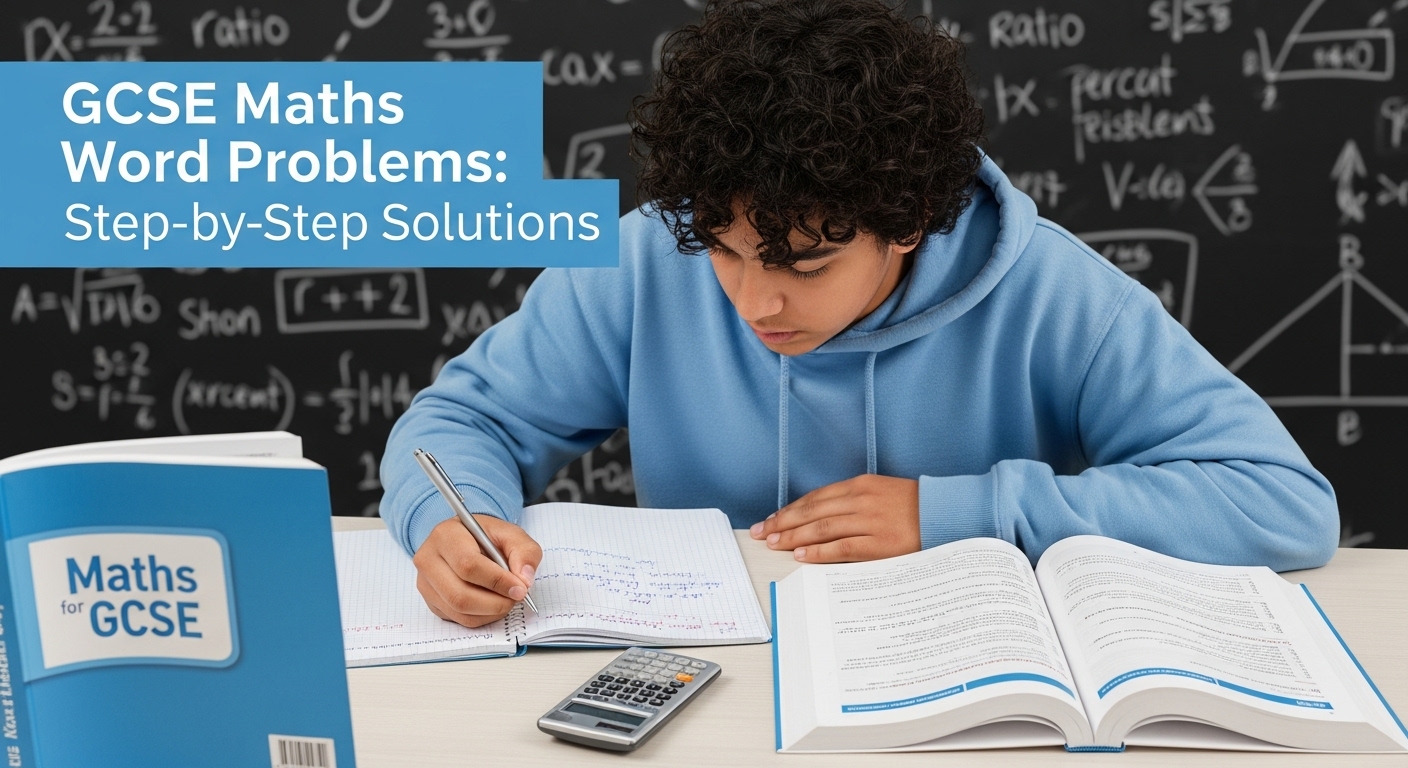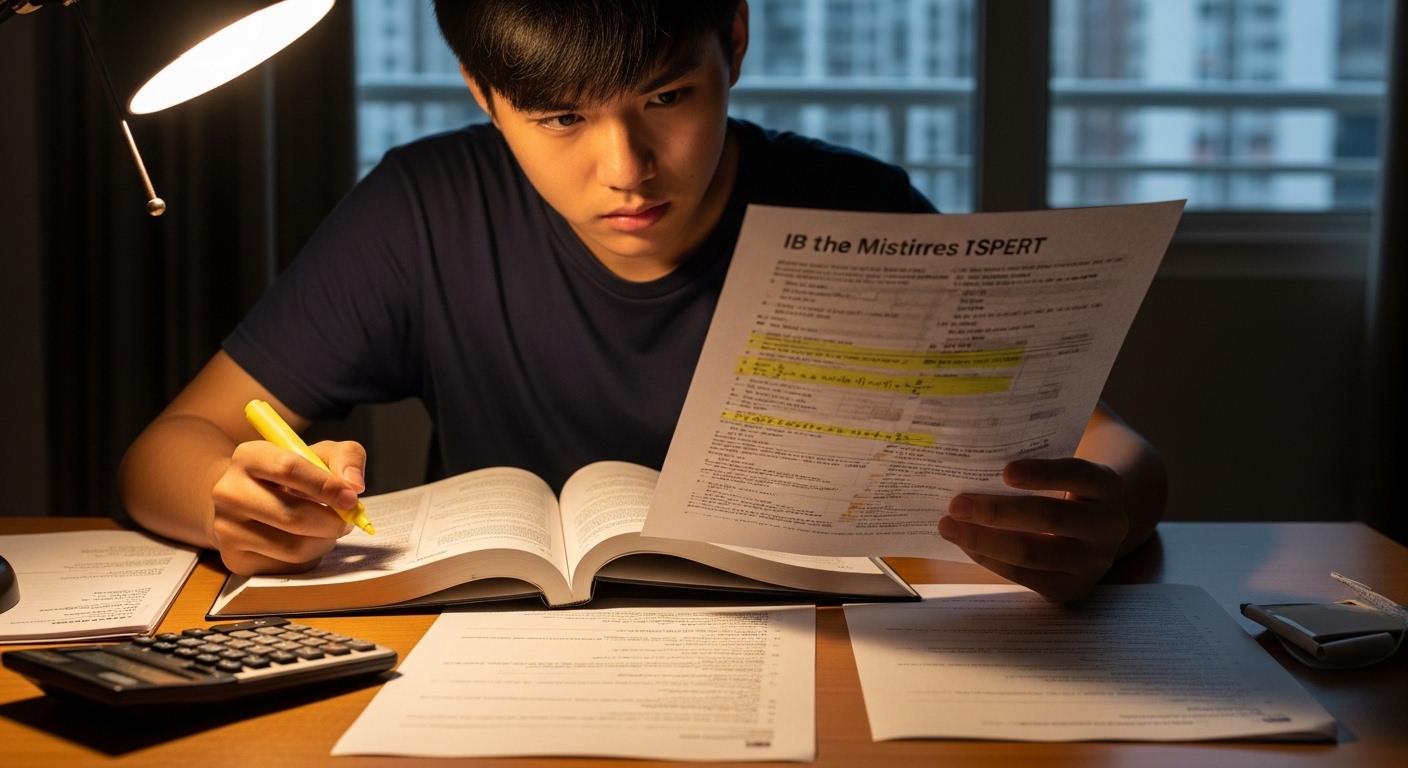Introduction
For many students, GCSE maths word problems are where everything gets tricky. You understand the maths — but when it’s wrapped inside long sentences and real-world contexts, it suddenly feels harder to know where to start.
The truth is, word problems test your ability to think mathematically, not just calculate. They measure how well you can translate information into equations and logical steps.
In this guide, we’ll break down exactly how to approach word problems with confidence — step by step — using real examples and clear solutions.
Table of Contents
What Are GCSE Maths Word Problems?
Word problems describe mathematical situations in everyday language. Instead of giving you numbers and symbols directly, they ask you to:
- Understand the situation.
- Identify the relevant maths topic.
- Set up equations or expressions.
- Solve for the answer.
You’ll find them across every topic: algebra, ratios, percentages, geometry, and probability.
Why Students Struggle with Word Problems
It’s not usually the maths itself — it’s the translation between words and numbers. Common challenges include:
- Misreading or skipping key information.
- Overcomplicating the question.
- Not recognising which topic is being tested.
- Losing marks for incomplete work.
The good news? Once you learn a structured approach, word problems become much easier.

Step-by-Step Method for Solving GCSE Maths Word Problems
Let’s examine a simple, repeatable process that applies to almost any question.
Step 1: Read Carefully and Identify What’s Being Asked
Underline the key details and highlight what the question actually wants you to find.
Example:
A car travels 180 km in 3 hours. What is its average speed?
Ask yourself: what do I know? What do I need to find?
- Distance = 180 km
- Time = 3 hours
- Need to find: speed
Step 2: Choose the Right Formula or Operation
Match each situation to the topic it best fits. Here, it’s a speed-distance-time problem.
Formula: Speed = Distance/Time
Step 3: Substitute Values
Speed=180 / 3 = 60
Step 4: Write a Clear Answer
Average speed = 60 km/h
Example 2: Percentage Word Problem
A shop reduces the price of a £50 jacket by 20%. What is the new price?
Step 1: Identify
- Original price = £50
- Reduction = 20%
Step 2: Calculate 20% of £50
20% × 50 = 10
Step 3: Subtract from Original Price
50 − 10 = 40
New price = £40
“GCSE Maths Formula Sheet 2025 Explained.”
Example 3: Ratio Word Problem
The ratio of boys to girls in a class is 3:5. If there are 24 students in total, how many boys are there?
Step 1: Add ratio parts
3 + 5 = 8
Step 2: Divide the total by 8
24 ÷ 8 = 3
Step 3: Multiply by the boys’ part
3 × 3 = 9
There are nine boys in the class.
Example 4: Algebra Word Problem
Sarah is twice as old as Tom. The sum of their ages is 27. How old is each?
Step 1: Let Tom’s age = x
Then Sarah’s age = 2x
Step 2: Write the equation
x + 2x = 27
Step 3: Solve for x
3x = 27 ⇒ x = 9
Tom = 9 years old
Sarah = 18 years old
Example 5: Geometry Word Problem
A rectangular garden is 8 m long and 5 m wide. Find its area and perimeter.
Step 1: Area
Area = 8×5 = 40 m^2
Step 2: Perimeter
Perimeter = 2 (8+5) = 26 m
Area = 40 m², Perimeter = 26 m
How to Get Better at GCSE Maths Word Problems
- Practise regularly: Word problems require repetition. The more you do, the faster you’ll recognise question patterns.
- Highlight key data: Use underlining or colour coding when reading problems.
- Label units — Always include £, m, %, etc. Missing units can cost marks.
- Check your answer — Does it make sense? Is it too big or too small?
- Use past papers — They show you how topics are combined in real exams.
Common Mistakes to Avoid
- Rushing without reading the full question.
- Writing answers without showing steps.
- Mixing up operations (e.g., adding instead of multiplying).
- Forgetting to convert units like minutes to hours or centimetres to metres.
Being methodical and slowing down can add easy marks to your score.
FAQs About GCSE Maths Word Problems
Are word problems harder than normal questions?
Not really — they test how well you understand the concept. Once you break them into steps, they’re often easier than they look.
How do I know what maths to use?
Look for trigger words:
- Share equally → Division
- Increased by / decreased by → Percentage
- Altogether / total → Addition
- Each / per → Multiplication or ratio
How can I improve faster?
Work through past paper questions by topic and time yourself. Focus on one skill (like percentages or ratios) until it feels automatic.
What are GCSE maths word problems?
They’re written questions that require translating real-life scenarios into mathematical equations.
Why are word problems important?
They test your ability to apply maths in real-world situations, a key GCSE skill.
How can I improve my word problem skills?
Practise regularly using structured examples from Mathzem.
What’s the best way to approach a tricky word problem?
Break it into smaller steps and identify what the question is really asking.
Are word problems harder than calculation questions?
Not once you learn to decode the language—they become very manageable.
Where can I find free GCSE word problem practice?
You can access free courses and exercises on Mathzem’s website
Conclusion
Word problems don’t have to be scary. With a clear process — read, identify, calculate, check — you can approach any question with confidence.
The key to mastering GCSE maths word problems is practice, structure, and patience. Every question you solve improves your logical thinking, builds exam confidence, and moves you closer to that top grade.






